Onimusha 2: Samurai's Destiny
Review - Kristan gets his blade out and slices through Capcom's latest
The original Onimusha held the distinction of being the first PS2 title to sell a million copies in Japan, and was arguably one of the few must-have games in the early months of the console's life.
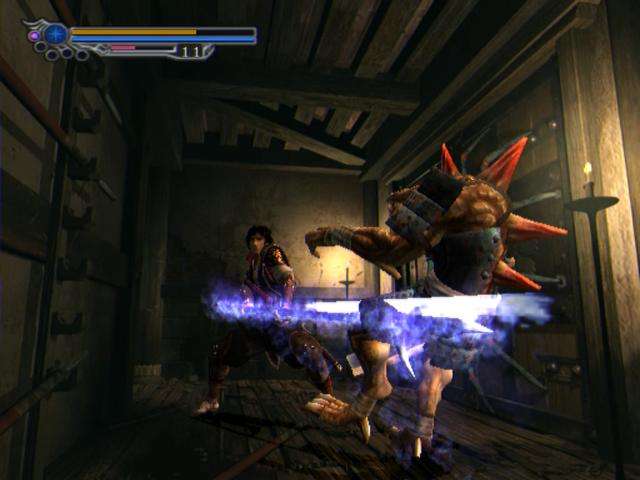
Kenji Inafune took the survival horror template, added a feudal Japanese setting full of Samurai warriors, upped the combat ante and pulled off a minor masterpiece of compelling action adventure - only slightly marred by being too short for some gamers' tastes.
Two years on from the original, and there's an air of expectancy surrounding the sequel. Following on from the technically superb Devil May Cry, and the acclaimed Resident Evil remake, Capcom's stock among discerning gamers is as good as any in the business right now.
Set several years on from the original's AD 1560 setting, a young warrior, Jubei, arrives back at his remote mining village home to find it in ruins. And guess what? He's not a happy chappy, and is determined to avenge the King of Demons responsible for this act of terror - a certain Nobunaga, or Nobby as he's affectionately known in the Eurogamer office.
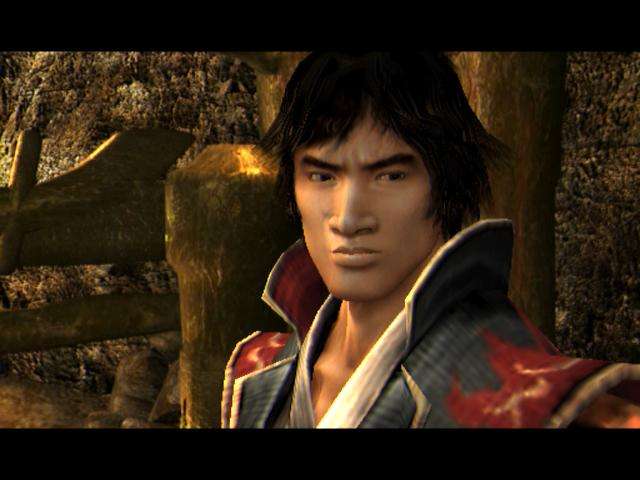
Minions must die
Seeing as Jubei's an angry young Samurai, it's only right and proper that you get to lay into some minion scum right from the off, and Onimusha 2 certainly doesn't disappoint in this department. Wielding a sword is something you get to do in just about every location, and the familiar combat-based gameplay kicks in as soon as the gorgeous and typically impressive intro cut scene is over.
The animation is up to the stunning standards that you'd expect, and the body count can get quite comical as you charge around bashing the crap out of anything that gets in your way. If blood, gore and extreme violence are your bag, then Onimusha 2 has lakes full of claret - and if you decide to return to a room that you've just cleared, the chances are your enemies will re-spawn. While this can be quite repetitive, you do at least have the option of charging past them, although if you do stand and fight you are rewarded in the long run by being able to power up your abilities.
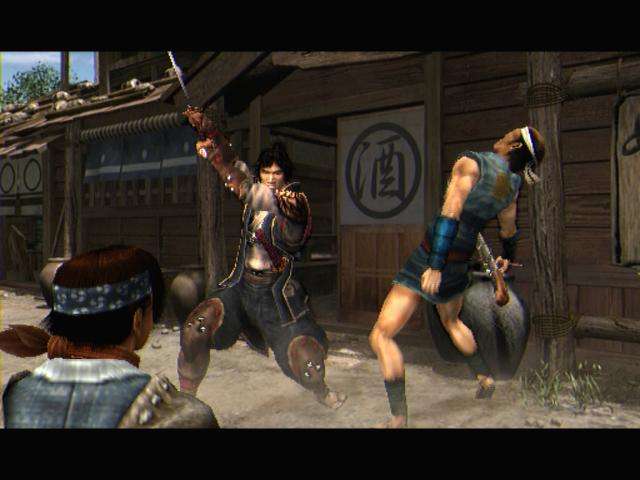
Soul man
As before, when you kill your victims their souls float off into the ether. Thanks to your cunning wrist mounted Gauntlet, you can absorb their souls and this has various beneficial effects on your character, ranging from a health boost, enhancing your magic power, to powering up your weapon and armour strengths. One new addition to the soul count is the purple variety; upon collecting five purple souls you're temporarily transformed into a super powered Onimusha and can deck your foes with ease.
Dotted around the various villages are magic mirrors that enable you to save your progress, or enhance your abilities in the way of your choosing. This lends an element of strategy to the proceedings as you can decide to focus on a particular weapon - or armour - to give yourself a better chance of success.
Puzzles and the inevitable door unlocking are a big part of the gameplay, (as with all Capcom action adventures) as is the requisite bulging inventory, and myriad of obscure objects to work out what to do with, and tons of journals and letters to try and make sense of. The initial brain teasers are predictably untaxing, but later on some of the slider puzzles are genuinely challenging and add a sense of light relief to relentless onslaught of evil wrong do-ers.
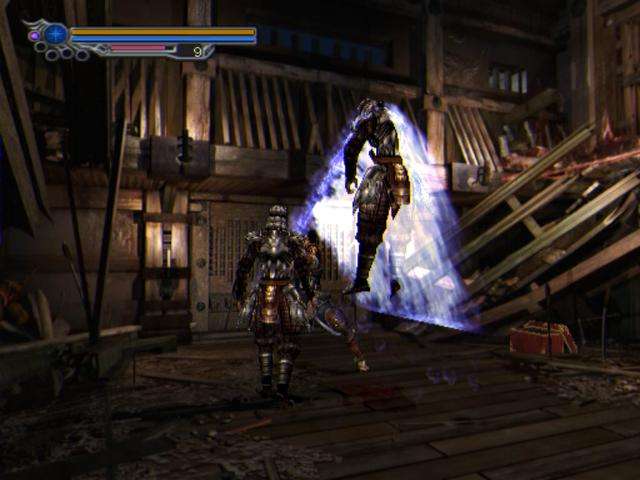
It's a bit of a looker
Visually, the backdrops are fantastically detailed, with some nice animated touches, like the beach with waves rolling in, and similar minutiae animate every scene. The character detail is also spot on, particularly during close up sequences with some decent lip-synching.
However, the old school approach of using fixed camera angles means the perennial problems associated with not being able to see your enemy properly blight the otherwise excellent combat element. Having recently played Silent Hill 2, Onimusha 2 feels comparatively old hat in this respect, and it would be nice if Capcom could have made more effort to bring the title up to date.
In particular, the numerous boss sections are blighted by the crippling inability to see what the hell's going on, and rather than be able to accurately carry out a strategy, you end up dashing around, flailing wildly in the hope that one of their unblockable attacks doesn't destroy your energy reserves completely. It's not that these sections are overly difficult, but you end up frustrated that it's the game mechanics that are hindering your progress, rather than your own failings.
Thankfully, one area Capcom has finally made an effort is the inclusion of a 60Hz mode, which will come as a welcome relief after the debacle of its previous bordered travesties (remember Devil May Cry?). Let's hope that all publishers are getting the message about this, at last.
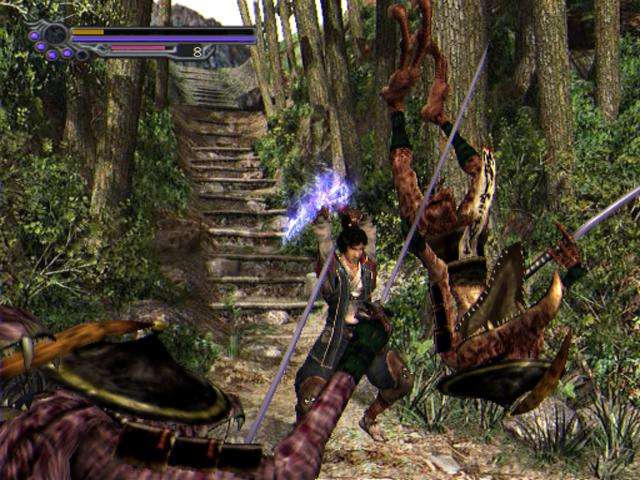
Nothing new
While all the points we've mentioned so far will give the impression of a great game, there are a number of issues that count against it, and most of them only really apply if you've played the original Onimusha. Fundamentally the game just doesn't feel new anymore. All the innovations that the original brought to the genre have been almost entirely rehashed, and several hours in your left feeling that there must be more to come - except it never really arrives. Yes, you get to play as various different characters at different stages, but this isn't enough to get the pulse racing to any degree.
Also, there really isn't an excuse to rely on static camera angles in this day and age. Granted, in games like Resident Evil it helps to deliver a certain amount of tension, but in Onimusha you're constantly bombarded by enemies, so this argument doesn't wash. As well as being frustrating and limiting, the use of static camera angles make the game look years out of date compared to Capcom's own Devil May Cry. It's annoying that Capcom didn't share the tech at its disposal.
Instead, Onimusha 2 comes across as a missed opportunity. Sure, newcomers to the series will get a lot out of it, but - and this is the crucial problem that the original didn't suffer from - there are so many great games coming out in the near future, that it would be tough to justify placing Onimusha 2 ahead of them.
That's not to say we didn't enjoy Onimusha 2, but you come away from it with the feeling that it could - and should - be so much better than it is.

